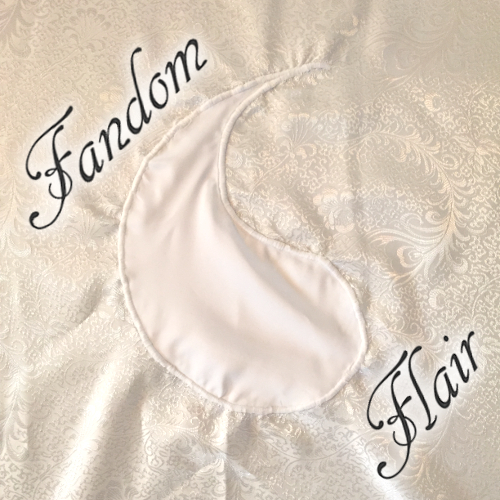
Welcome back to another edition of “Fandom Flair.” As promised, we’ll discuss the ins and outs of the Aes Sedai shawl, one of the most important pieces of clothing in the series.
One of the first things I did upon reading the books of The Wheel of Time was try to recreate as many Aes Sedai type accessories as possible. I sculpted Great Serpent rings out of clay. I bought a cheap turtle broach because it reminded me of the angreal that was found in Ebou Dar. I fell in love with paisley designs due to its similarity to the Flame of Tar Valon.
It wasn’t until recently that I actually set out to sew myself an Aes Sedai shawl. The fringe was the intimidating part. Anyone could cut out a triangle, but having that beautiful, long, flowing fringe… that was the only thing holding me at bay. Lucky for me, my sister beat me to the punch. For Christmas in 2012 my sister crafted us Aes Sedai shawls. They were simply done, plain fabrics, and added fringe. For her own shawl, she sewed a Flame of Tar Valon onto the middle; for mine, she drew in on with a black permanent marker. For a first ever attempt, they were amazing!
At JordanCon 7, I retired my old shawl and had it signed by Team Jordan. Now it’s hanging on my wall along with all my Wheel of Time artwork.
Now, before we go any further, let’s establish what exactly an Aes Sedai shawl is. To do this, I turned to Wheel of Time expert, and esteemed member of Team Jordan: Maria Simons. She told me that, “According to Jim [Robert Jordan], the only mandatory elements of the Aes Sedai shawl were the White Flame and the fringe of a color to match one's Ajah. Other than that, there could be great variation in size, the length of the fringe, and the fabric of the shawl itself. Many times (perhaps even most of the time; I'm not entirely sure), the shawl was embroidered with vines and leaves; the choice of vines and leaves was left up to the Aes Sedai. The actual color could vary as well; a Blue's shawl could be fringed in any shade of blue.”
In terms of style, that leaves this project wide open! You can literally choose any fabric you want, and as long as the fringe is your Ajah’s color, you’re good to go!
Step 1: Materials
Here’s a quick list of materials you’ll need to complete this project:
About 2 yards of main material
About 2 yards of a liner/backing material
About 3 yards of fringe
White fabric scraps for the Flame
Sewing machine
Thread
Pins
Fray Check (Optional)
As previously stated, you can pick any fabric you want. Silk, satin, gauze, jacquard, cotton, etc. In most cases, crafted shawls are typically done in fancy, shiny fabrics. Satin is a good choice because it’s very beautiful (though tricky to sew with). Jacquard was my first choice because how thick it is, and the shiny quality (but it’s usually expensive). Cotton is also a great fabric because of the ease of use, and how well it could be embroidered with vines and leaves if the desire arose.
In the end, I picked an outdoor upholstery fabric.

It was the perfect combination of thick, durable, and decorative! It has a sort of leafy pattern which fits very well into the Aes Sedai theme. While making a shawl for myself (in my Ajah color of White), I also picked up extra fabric for all the other colors as well. The Yellow and Green I gave to friends. The Blue and Gray are finished and hanging up in my closet. The Red and Brown still need to be completed.
Now a word on lining/backing fabric. This step is technically optional. Since most people will never see the back, if it's not nice and neat, that's not a problem. But there are some advantages to having a backing fabric. If you use a cotton, or a non-slip fabric, the shawl will sit nicer on your shoulders. I stupidly used a white satin-type fabric for my backing and it constantly needs to be held in place.
Lastly, you’ll need fringe. I found mine at a fabric warehouse. It’s about 4-5 inches long. Personally, I like longer fringe, but it’s very difficult to find in-store. Your best bet is buying online, but then you risk the colors not being what you expect. A great place for online fringe is Crazy Crow Trading Post. Almost everyone at JordanCon recommend buying fringe there.
Step 2: Triangles
Seriously, this project is very, very simple. It consists of sewing three straight lines to form a triangle. That’s basically it. Sure, there is the added difficulty of the Flame on the back, but if sewing those curves is what’s stopping you, there are other ways to get the Flame secured.
Start by measuring your wingspan—that is, your right palm across your shoulders to your left palm. You want the width of your shawl to be AT LEAST this long.
Next, measure the length from the base of your neck to the middle of your calf. This is the rough estimate of the length of your shawl. Of course, this is all based on the personal preference of the Aes Sedai, so if you want a shorter shawl, make it shorter; want it touching the ground, that’s where you measure to.
For my shawl, my wingspan was 60 inches. My length was 38 inches. The fabric I bought just happened to be 60 inches across, so all I had to do was measure 38 inches and cut my rectangle.

Next, you want to find the center of your rectangle on the longest side. This center spot will be the point of the shawl. Mark it, and then trace a line from that point to the top right corner. Repeat the line from the point to the top left corner.

Cut along the lines and you have your basic shawl already done! If you want to use a backing fabric, you can repeat these directions and make another triangle, or you can trace your shawl on top of it and cut it out that way.
At this point, you have the option of using Fray Check on your fabrics. Fray Check—or something similar—is used to keep the material from fraying after it’s been cut. Some fabrics don’t fray, like knits, spandex, fleece, and velvet. If your fabric does fray, applying Fray Check makes the seam so much nicer!
Step 3: The Flame
Adding on the Flame is an essential step to any Aes Sedai shawl. It is what makes it an Aes Sedai shawl. You also have a few choices about how big you want it to be, what fabric you want to use, do you want it fancy or plain.... This is a great way to customize your shawl and make it your own.
Since I had scraps of my beautiful, white material, I used it as the Flame for the Green Ajah shawl I made. This turned out really cool, because I was able to line it up, and keep the pattern continuous. For my shawl, since it was already white, I needed a material that would stand out enough. I used the same white satin I used as my backing.
First, you need to cut out the pattern. I just printed one from online. This way, you have perfect lines, and you can blow it up or shrink it down to the size you want.
Cut it out, and trace it on your fabric. For the Green Ajah shawl this was a bit more complex because I had to get it lined up properly:

I also applied Fray Check to the Flame.
Pin it on.

And sew!
I started at the point because that was the trickiest part. But you're welcome to do it the way that's more comfortable for you.
And here we have it:


Now, an alternative to sewing would be using a fabric adhesive. You can get fabric adhesive that is double sided—I used Pellon Peltex Two-Sided Fusible fabric adhesive. This is basically a glue that melts with the heat of an iron and binds the two fabrics together. I’ve used this method successfully on quite a few projects. If you cut out a layer of adhesive that is the same shape as your Flame, you can glue it to your shawl in as little as five minutes. Super simple!
Step 4: Sewing the pieces together
Here’s where it all starts to come together. Think of your shawl as a sandwich. You have the top and bottom buns (the shawl face and the backing) and you have the yummy toppings (the fringe). That means, you need to sew with each item in the proper order to get it looking right.
FIRST place your shawl face (the one with the Flame sewn on) face down on the floor.
NEXT put your fringe on top, layering it so it completely covers both sides and the point at the bottom.
THEN put your backing fabric face up. Think Grilled Cheese: you want the top and bottom to both have the yummy browned buttered side showing. So you want the right side of your shawl and the right side of your backing fabric to be facing out.
Pin this all together.

Sew only the angled sides with fringe. Start at the point and sew a straight line to the top left corner. End your seam. Start at the point again and sew a straight line to the top right corner. End your seam. Sew a line straight across the top to completely close in the shawl. End your seam. Trim off any excess fabric at the top and apply a coat of Fray Check if necessary.
Another method would be to tuck the top of the shawl under a half an inch or so and sew it close. This is the way I did it, but it was more difficult. It caused bunching at the corners, which is not very pretty.
Step 5: Finishing touches
Now all you have to do is pull off the fringe safety string and cut off any stray strands that are too long!


Wear your shawl with pride! Not only are you filled with the sense of accomplishment, but also with saidar.





Next time, we’ll switch gears a bit and show how to make fandom shoes. Thanks for reading!












Recommended Comments
There are no comments to display.
Join the conversation
You can post now and register later. If you have an account, sign in now to post with your account.
Note: Your post will require moderator approval before it will be visible.